Unit 4 Don't eat in class SectionA Grammar-3c 课件+内嵌视频
文档属性
| 名称 | Unit 4 Don't eat in class SectionA Grammar-3c 课件+内嵌视频 |  | |
| 格式 | pptx | ||
| 文件大小 | 8.0MB | ||
| 资源类型 | 试卷 | ||
| 版本资源 | 人教新目标(Go for it)版 | ||
| 科目 | 英语 | ||
| 更新时间 | 2023-03-12 19:12:25 | ||
图片预览


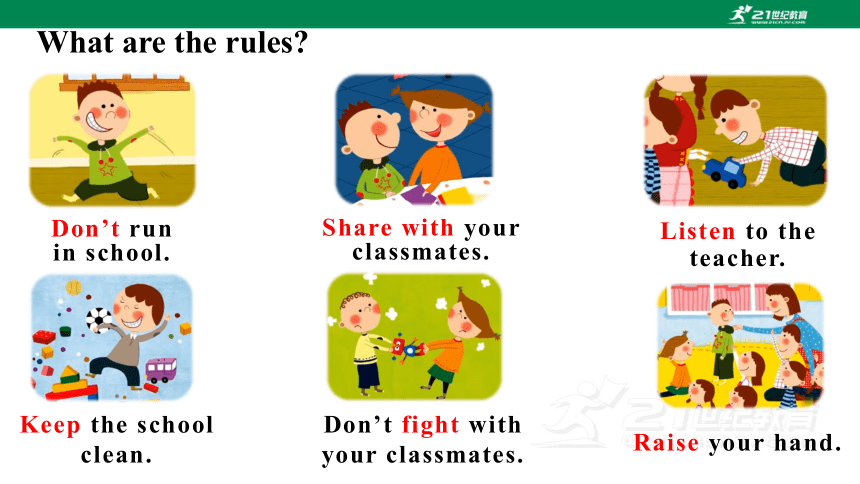
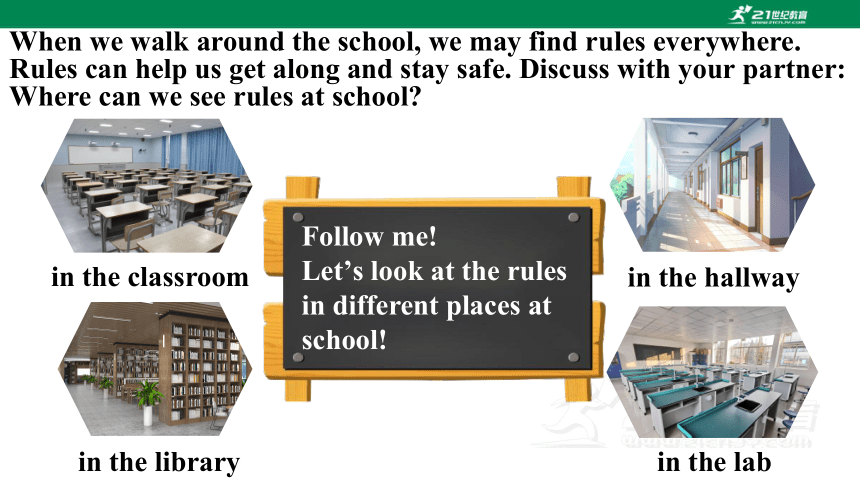

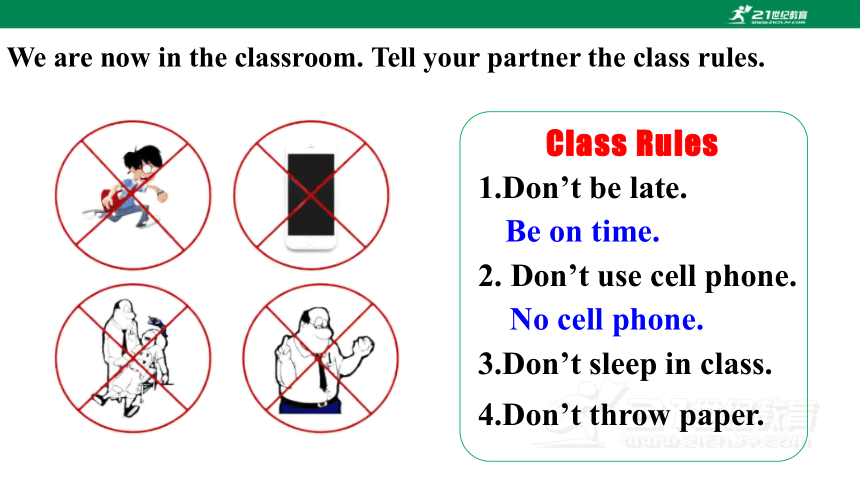
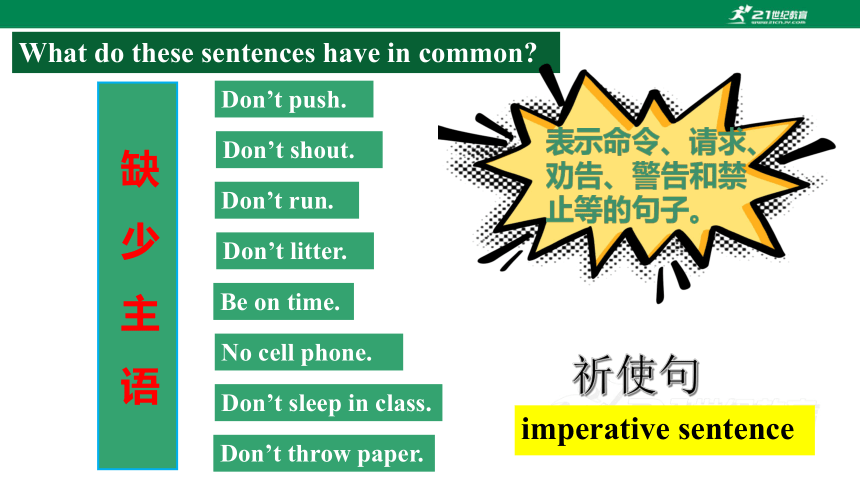
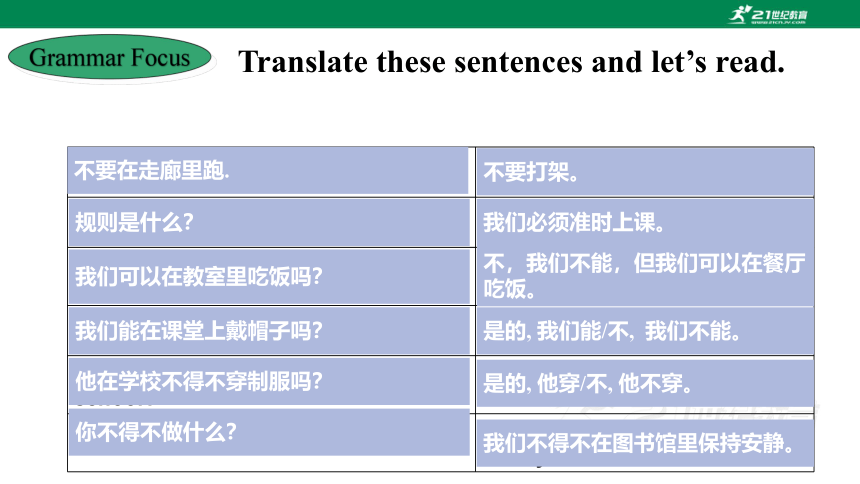
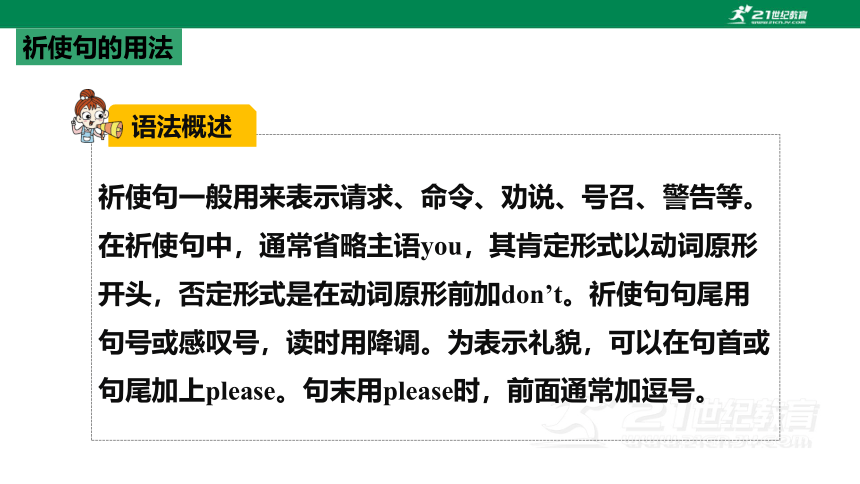
文档简介
(共24张PPT)
Unit 4 Don’t eat in class.
Section A Grammar Focus-3c
Watch a video
What are the rules
Don’t run in school.
Share with your classmates.
Listen to the teacher.
Keep the school clean.
Don’t fight with your classmates.
Raise your hand.
When we walk around the school, we may find rules everywhere. Rules can help us get along and stay safe. Discuss with your partner: Where can we see rules at school
in the classroom
in the library
in the hallway
in the lab
Follow me!
Let’s look at the rules in different places at school!
Here, we’re in the hallway.
Look at the rules, can you tell what they are
1. Don’t push.
No pushing.
2. Don’t shout.
No shouting.
3. Don’t run.
No running.
4. Don’t litter.
No littering.
Hallway Rules
We are now in the classroom. Tell your partner the class rules.
Class Rules
1.Don’t be late.
Be on time.
2. Don’t use cell phone.
No cell phone.
3.Don’t sleep in class.
4.Don’t throw paper.
What do these sentences have in common
Don’t push.
Be on time.
Don’t shout.
Don’t run.
Don’t litter.
No cell phone.
Don’t sleep in class.
Don’t throw paper.
缺 少 主 语
表示命令、请求、劝告、警告和禁止等的句子。
祈使句
imperative sentence
Translate these sentences and let’s read.
Grammar Focus
Don’t run in the hallways. Don’t fight.
What are the rules We must be on time for class.
Can we eat in the classroom No, we can’t, but we can eat in the dining hall.
Can we wear a hat in class Yes, we can./No, we can’t.
Does he have to wear a uniform at school Yes, he does./No, he doesn’t.
What do you have to do We have to be quiet in the library.
不要在走廊里跑.
不要打架。
规则是什么?
我们必须准时上课。
我们可以在教室里吃饭吗?
不,我们不能,但我们可以在餐厅吃饭。
我们能在课堂上戴帽子吗?
他在学校不得不穿制服吗?
你不得不做什么?
是的, 我们能/不, 我们不能。
是的, 他穿/不, 他不穿。
我们不得不在图书馆里保持安静。
祈使句的用法
祈使句一般用来表示请求、命令、劝说、号召、警告等。在祈使句中,通常省略主语you,其肯定形式以动词原形开头,否定形式是在动词原形前加don’t。祈使句句尾用句号或感叹号,读时用降调。为表示礼貌,可以在句首或句尾加上please。句末用please时,前面通常加逗号。
语法概述
Don’t run in the hallways. Don’t fight.
What are the rules We must be on time for class.
Can we eat in the classroom No, we can’t, but we can eat in
the dining hall.
Can we wear a hat in class Yes, we can./No, we can’t.
Does he have to wear a uniform at school Yes, he does./No, he doesn’t.
What do you have to do We have to be quiet in the library.
1:祈使句的否定句怎样构成?肯定句呢?一般在什么情况下会用祈使句?
祈使句的否定句在动词原形前加don’t,表示“不要做什么事”。
祈使句的肯定句通常是以动词原形开头的。
祈使句一般用于上级对下级,长辈对晚辈之间,表示命令、劝说或警告,也可表示请求。
Don’t run in the hallways. Don’t fight.
What are the rules We must be on time for class.
Can we eat in the classroom No, we can’t, but we can eat in
the dining hall.
Can we wear a hat in class Yes, we can./No, we can’t.
Does he have to wear a uniform at school Yes, he does./No, he doesn’t.
What do you have to do We have to be quiet in the library.
2:情态动词在用法上有什么共同点?
can, must, have to等情态动词后接动词原形。
Don’t run in the hallways. Don’t fight.
What are the rules We must be on time for class.
Can we eat in the classroom No, we can’t, but we can eat in
the dining hall.
Can we wear a hat in class Yes, we can./No, we can’t.
Does he have to wear a uniform at school Yes, he does./No, he doesn’t.
What do you have to do We have to be quiet in the library.
3:can在本单元主要表示什么含义?它还可表达什么意思?
can的意思是“能够;允许“,还可表示“能力” 。
Don’t run in the hallways. Don’t fight.
What are the rules We must be on time for class.
Can we eat in the classroom No, we can’t, but we can eat in
the dining hall.
Can we wear a hat in class Yes, we can./No, we can’t.
Does he have to wear a uniform at school Yes, he does./No, he doesn’t.
What do you have to do We have to be quiet in the library.
4:have to在句法上与其他情态动词有何区别?
have to有人称和数的变化。
have to与must的不同点
have to 1. 强调因客观因素影响而不得不做某事,跟主观意愿无关,通常上下文中会有暗示客观因素的句子,多译为“不得不”。
2. 可用于不同的时态,有人称和数的变化,其一般现在时的第三人称单数形式为has to;过去式为had to。
must 1. 表示因主观需要或责任感的驱使而有必要或义务去做某事,多译为“必须”。
2. 一般只用来表示现在,没有人称和数的变化。
单项选择。
( ) 1. David, _______ make trouble at school.
A. can’t B. don’t C. doesn’t
( ) 2. —Mom, can I play computer games this evening
—_______ your homework first, and then we’ll talk about it.
A. Finishing B. Finish C. To finish D. Finished
( ) 3. Buses _______ stop when the traffic lights turn red.
A. can B. may C. must
B
B
C
( ) 4. We should keep quiet in the library. We _____ speak loudly( 大声地).
A. must B. mustn’t C. can D. needn’t
( ) 5. I _____ go now, or I’ll miss my train.
A. can B. might C. must D. could
( ) 6. He _____ stay at home, because it’s raining outside.
A. have to B. has to C. must D. can’t
B
B
C
3a
Write the rules for the school library.
Library Rules
1. ____________________________
2. ____________________________
3. ____________________________
4. ____________________________
Don’t talk.
1
2
3
4
Don’t eat in the library.
Don’t listen to music in the library.
Don’t take photos in the library.
Use the words to make questions about the rules. Then write answers according to your school.
Q: Does she have to be quiet in the library (she/have to/in the library)
A: Yes, she does.
Be quiet
Eat
Q:__________________________________ (he/have to/in the dining hall)
A:__________________________________
3b
Does he have to eat in the dinning hall
Yes, he does.
Q:_________________________________(we/can/in the hallways)
A:_________________________________
Listen to music
Can we listen to music in the hallways
No, we can’t.
Wear a hat
Q:_________________________________(we/can/in the classroom)
A:_________________________________
Can we wear a hat in the classroom
No, we can’t.
3c
Make up five cool rules for your dream school. Share your rules with the class. Your classmates vote for the Coolest School!
1.We can eat in class.
2.We don’t have to come to school every day.
3. ...
At my dream
school, we don’t have
to come to school
every day. We...
谢谢
21世纪教育网(www.21cnjy.com)
中小学教育资源网站
兼职招聘:
https://www.21cnjy.com/recruitment/home/admin
Unit 4 Don’t eat in class.
Section A Grammar Focus-3c
Watch a video
What are the rules
Don’t run in school.
Share with your classmates.
Listen to the teacher.
Keep the school clean.
Don’t fight with your classmates.
Raise your hand.
When we walk around the school, we may find rules everywhere. Rules can help us get along and stay safe. Discuss with your partner: Where can we see rules at school
in the classroom
in the library
in the hallway
in the lab
Follow me!
Let’s look at the rules in different places at school!
Here, we’re in the hallway.
Look at the rules, can you tell what they are
1. Don’t push.
No pushing.
2. Don’t shout.
No shouting.
3. Don’t run.
No running.
4. Don’t litter.
No littering.
Hallway Rules
We are now in the classroom. Tell your partner the class rules.
Class Rules
1.Don’t be late.
Be on time.
2. Don’t use cell phone.
No cell phone.
3.Don’t sleep in class.
4.Don’t throw paper.
What do these sentences have in common
Don’t push.
Be on time.
Don’t shout.
Don’t run.
Don’t litter.
No cell phone.
Don’t sleep in class.
Don’t throw paper.
缺 少 主 语
表示命令、请求、劝告、警告和禁止等的句子。
祈使句
imperative sentence
Translate these sentences and let’s read.
Grammar Focus
Don’t run in the hallways. Don’t fight.
What are the rules We must be on time for class.
Can we eat in the classroom No, we can’t, but we can eat in the dining hall.
Can we wear a hat in class Yes, we can./No, we can’t.
Does he have to wear a uniform at school Yes, he does./No, he doesn’t.
What do you have to do We have to be quiet in the library.
不要在走廊里跑.
不要打架。
规则是什么?
我们必须准时上课。
我们可以在教室里吃饭吗?
不,我们不能,但我们可以在餐厅吃饭。
我们能在课堂上戴帽子吗?
他在学校不得不穿制服吗?
你不得不做什么?
是的, 我们能/不, 我们不能。
是的, 他穿/不, 他不穿。
我们不得不在图书馆里保持安静。
祈使句的用法
祈使句一般用来表示请求、命令、劝说、号召、警告等。在祈使句中,通常省略主语you,其肯定形式以动词原形开头,否定形式是在动词原形前加don’t。祈使句句尾用句号或感叹号,读时用降调。为表示礼貌,可以在句首或句尾加上please。句末用please时,前面通常加逗号。
语法概述
Don’t run in the hallways. Don’t fight.
What are the rules We must be on time for class.
Can we eat in the classroom No, we can’t, but we can eat in
the dining hall.
Can we wear a hat in class Yes, we can./No, we can’t.
Does he have to wear a uniform at school Yes, he does./No, he doesn’t.
What do you have to do We have to be quiet in the library.
1:祈使句的否定句怎样构成?肯定句呢?一般在什么情况下会用祈使句?
祈使句的否定句在动词原形前加don’t,表示“不要做什么事”。
祈使句的肯定句通常是以动词原形开头的。
祈使句一般用于上级对下级,长辈对晚辈之间,表示命令、劝说或警告,也可表示请求。
Don’t run in the hallways. Don’t fight.
What are the rules We must be on time for class.
Can we eat in the classroom No, we can’t, but we can eat in
the dining hall.
Can we wear a hat in class Yes, we can./No, we can’t.
Does he have to wear a uniform at school Yes, he does./No, he doesn’t.
What do you have to do We have to be quiet in the library.
2:情态动词在用法上有什么共同点?
can, must, have to等情态动词后接动词原形。
Don’t run in the hallways. Don’t fight.
What are the rules We must be on time for class.
Can we eat in the classroom No, we can’t, but we can eat in
the dining hall.
Can we wear a hat in class Yes, we can./No, we can’t.
Does he have to wear a uniform at school Yes, he does./No, he doesn’t.
What do you have to do We have to be quiet in the library.
3:can在本单元主要表示什么含义?它还可表达什么意思?
can的意思是“能够;允许“,还可表示“能力” 。
Don’t run in the hallways. Don’t fight.
What are the rules We must be on time for class.
Can we eat in the classroom No, we can’t, but we can eat in
the dining hall.
Can we wear a hat in class Yes, we can./No, we can’t.
Does he have to wear a uniform at school Yes, he does./No, he doesn’t.
What do you have to do We have to be quiet in the library.
4:have to在句法上与其他情态动词有何区别?
have to有人称和数的变化。
have to与must的不同点
have to 1. 强调因客观因素影响而不得不做某事,跟主观意愿无关,通常上下文中会有暗示客观因素的句子,多译为“不得不”。
2. 可用于不同的时态,有人称和数的变化,其一般现在时的第三人称单数形式为has to;过去式为had to。
must 1. 表示因主观需要或责任感的驱使而有必要或义务去做某事,多译为“必须”。
2. 一般只用来表示现在,没有人称和数的变化。
单项选择。
( ) 1. David, _______ make trouble at school.
A. can’t B. don’t C. doesn’t
( ) 2. —Mom, can I play computer games this evening
—_______ your homework first, and then we’ll talk about it.
A. Finishing B. Finish C. To finish D. Finished
( ) 3. Buses _______ stop when the traffic lights turn red.
A. can B. may C. must
B
B
C
( ) 4. We should keep quiet in the library. We _____ speak loudly( 大声地).
A. must B. mustn’t C. can D. needn’t
( ) 5. I _____ go now, or I’ll miss my train.
A. can B. might C. must D. could
( ) 6. He _____ stay at home, because it’s raining outside.
A. have to B. has to C. must D. can’t
B
B
C
3a
Write the rules for the school library.
Library Rules
1. ____________________________
2. ____________________________
3. ____________________________
4. ____________________________
Don’t talk.
1
2
3
4
Don’t eat in the library.
Don’t listen to music in the library.
Don’t take photos in the library.
Use the words to make questions about the rules. Then write answers according to your school.
Q: Does she have to be quiet in the library (she/have to/in the library)
A: Yes, she does.
Be quiet
Eat
Q:__________________________________ (he/have to/in the dining hall)
A:__________________________________
3b
Does he have to eat in the dinning hall
Yes, he does.
Q:_________________________________(we/can/in the hallways)
A:_________________________________
Listen to music
Can we listen to music in the hallways
No, we can’t.
Wear a hat
Q:_________________________________(we/can/in the classroom)
A:_________________________________
Can we wear a hat in the classroom
No, we can’t.
3c
Make up five cool rules for your dream school. Share your rules with the class. Your classmates vote for the Coolest School!
1.We can eat in class.
2.We don’t have to come to school every day.
3. ...
At my dream
school, we don’t have
to come to school
every day. We...
谢谢
21世纪教育网(www.21cnjy.com)
中小学教育资源网站
兼职招聘:
https://www.21cnjy.com/recruitment/home/admin
同课章节目录
- Unit 1 Can you play the guitar?
- Section A
- Section B
- Unit 2 What time do you go to school?
- Section A
- Section B
- Unit 3 How do you get to school?
- Section A
- Section B
- Unit 4 Don't eat in class.
- Section A
- Section B
- Unit 5 Why do you like pandas?
- Section A
- Section B
- Unit 6 I'm watching TV.
- Section A
- Section B
- Review of Units 1-6
- Unit 7 It's raining!
- Section A
- Section B
- Unit 8 Is there a post office near here?
- Section A
- Section B
- Unit 9 What does he look like?
- Section A
- Section B
- Unit 10 I'd like some noodles.
- Section A
- Section B
- Unit 11 How was your school trip?
- Section A
- Section B
- Unit 12 What did you do last weekend?
- Section A
- Section B
